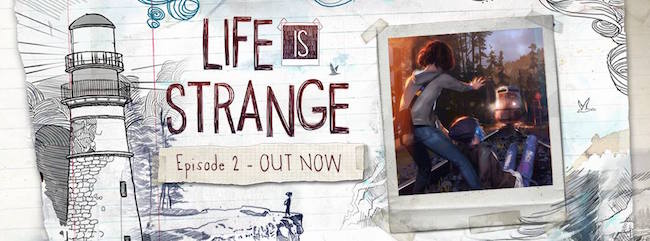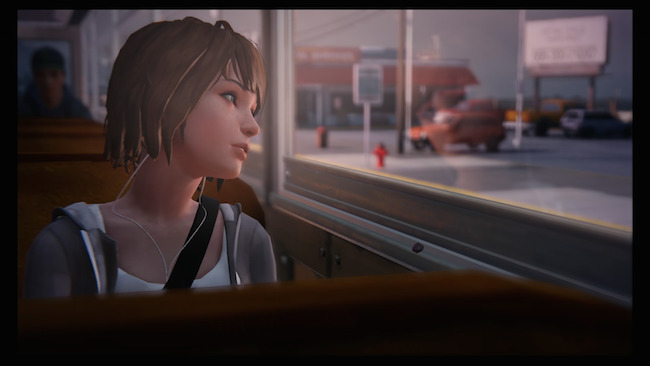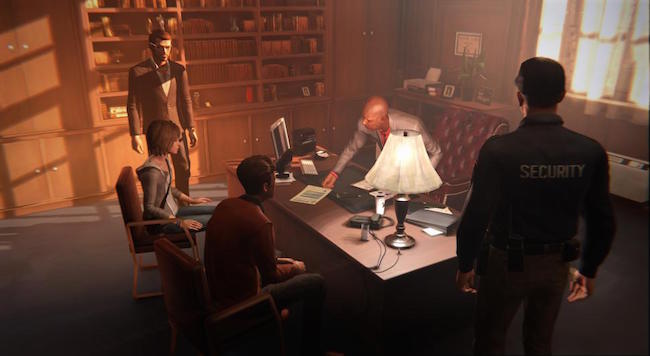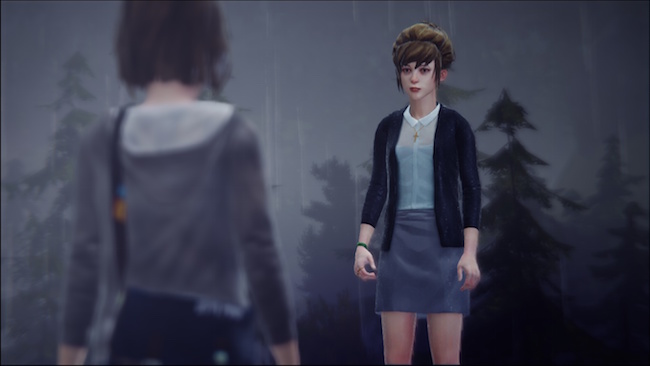
Life is Strange is a game series that I never thought I’d enjoy as much as I do. Don’t get me wrong, I wholeheartedly believe that it’s both interesting and well designed, but part of me also feels as if I like this game so much more simply because it’s trying something different. In other mediums, the concept of an everyday teenage girl coming of age is far from original, and, in terms of the science fiction elements, it’s not as if we’ve not seen these ideas before – the game actively references Twin Peaks, if you look closely. But none of this has really been pulled off in a game before, not in the way DONTNOD are doing things anyway. It’s quirky in a way that you’ll either love or hate, but if you’re reading this now, I’m going to assume you’ve played the first episode and are at least willing to give the second episode a chance.

As a bit of a quick re-cap on the premise, the previous episode introduced us to Max Caulfield; a somewhat awkward, unexceptional teenager who has returned to her hometown on a photography scholarship. At first, it appears to be a typical coming of age story; playing into the fantasy of reliving the cliche moments that we all experienced during high school. However, things grow more complicated when Max discovers she has the ability to manipulate time, throwing her into a twisted spiral of events after she uses these powers to save the life of her estranged best friend – who was almost shot dead during an altercation in the girls bathroom. As the player, you are forced to make decisions that will affect other people and directly put yourself in danger. Using time travel as a tool, you can reconstruct events to your advantage, but this only goes so far you cannot see the consequences of your actions beyond the immediate future.
Episode 1, “Chrysalis” (referring to Butterflies), focused primarily around the school and getting players to experiment with some typical social scenarios. You know, the usual: talking with new people, making friends, dealing with bullies, resolving stupid teenage squabbles and so on. It worked well in a way that Bully did, but with a neat Telltale twist; and as an adult now, I thought it was fascinating to approach these issues from a more experienced perspective. However, in saying that, I also quickly remembered why being young could be so frustrating at times. Teenagers can often be irrational in their behaviour, which makes them complicated to deal with at times, but they also have the ability to point out things which adults fail to acknowledge, and this makes it infuriating when people refused to take Max seriously. Despite your powers, you’re still just a “kid,” so you will need to be tactful in your approach as the situation escalates.

A common question that comes up while playing Life is Strange is: “should I watch and wait, or should I act now?” For example, during in an incident of domestic violence, should I step out of hiding to prevent it, or would that simply make things worse? There are some very confronting scenarios in the game, but a big concern of mine was whether there would be any serious ramifications to hit home the danger of getting too involved in other people’s problems. Without this, your actions are basically hollow, so I felt encouraged when Max started receiving threatening messages because of something I did during the first episode. Initially, it made me reconsider whether I made the right choice to begin with, given that nobody listened to me anyway. But having learned from the consequences, I think that insight helped me to make smarter decisions moving forward. For a game driven by choices, this is exactly what you’d want.
In Episode 2, the adventure continues with your estranged best friend, Chloe; taking you away from the tropes of the school for most of the time, which was great. As an adult male, Chloe’s personality kind of grinds my gears, so I enjoy ensuring Max stands her ground with her; though that doesn’t necessarily mean I dislike her. There are some issues I can really appreciate, having once been a teenager, and while the writing team handles some better than others; I related well with most of them. Something that really hit me, however, was the concept of new problems I’ve never thought about: in particular, how much a viral video could hurt someone. It wasn’t quite a thing yet when I was still in school, so seeing the amount of damage it could cause a young girl really highlighted the danger in social media. Like with the domestic violence in the last episode, my influence throughout this crisis is what resonated with me the most.

A lot about the dialogue is still very quirky though, so the narrative isn’t necessarily taking a darker turn overall. It’s a mostly healthy balance between teenage melodrama and legitimate issues. A lot of time this episode is spent testing out your abilities, getting to understand Chloe, and learning more about the disappearance of Rachel Ambers. As a whole, there is a very “Heroes” vibe about it, which is cool, though around halfway through things get bogged down because of a tedious bottle-fetching quest. Despite all this, Out of Time definitely ups the ante and introduces new threads which are guaranteed to branch out in future episodes. I also appreciate that the cast of characters are not stupid. The powers have a noticeable toll on Max, and she is well aware they might not last forever. And not just that, the people around her are not oblivious to the fact that all of a sudden she’s popping up anywhere there’s a problem.
What I think I like most about Life is Strange is the general vibe. It has a great soundtrack that so perfectly fits with the world, coupled with a simplistic art style which really grows on you after awhile. All those mellow acoustic tracks always hit the mark, whether it is simply wandering through the halls of the school or one of those Donnie Darko style montages where it cuts to each of the cast reflecting on events after the fact. It very much feels like a playlist which speaks to Max’s introvert personality, and I really dig that about it. I’m actually pretty keen on the presentation overall, and feel that the interface is working much better than with Telltale’s games. I like how things are highlighted in the environment and that the developers don’t force in any quick-time-events or gameplay clearly unsuited to the genre. Despite the sci-fi elements, it’s a character story and the importance of your actions is starting to grow more apparent.
In a game driven by choice, consequence is arguably the most important component. Life is Strange gives players the unique ability to rewind time in order to manipulate events, which is very cool, but for me, Episode 2 really needed to hammer home whether or not we’d be dealing with long-term ramifications. Fortunately, DONTNOD delivered on this, but what surprised me was that while I started to question my actions in the previous episode, I didn’t exactly regret my “mistakes.” Like in real life, I simply dealt with it and moved on, and I felt empowered to make smarter decisions as a result. There was no sense of being punished for shock value. As a whole, this episode is a little inconsistent (with things bogging down in the middle), but it was still great to divert away from the school, and it does close with an emotional climax that packs a punch. DONTNOD are doing a lot of things right, and I’m invested to see where it goes.
EDITOR NOTE: this game was provided to us by the publisher, and reviewed on PC across 3 hours of gameplay. Please also understand that in an effort to be fair, we will not score an episodic game until the season is complete.











